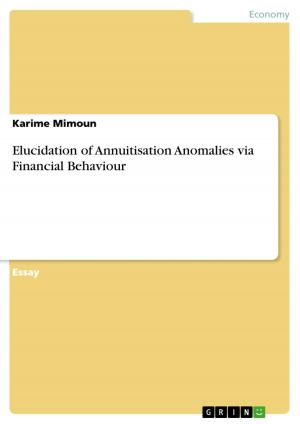| Author: | Daniel Detzer | ISBN: | 9783640658701 |
| Publisher: | GRIN Publishing | Publication: | July 8, 2010 |
| Imprint: | GRIN Publishing | Language: | English |
| Author: | Daniel Detzer |
| ISBN: | 9783640658701 |
| Publisher: | GRIN Publishing |
| Publication: | July 8, 2010 |
| Imprint: | GRIN Publishing |
| Language: | English |
Seminar paper from the year 2010 in the subject Business economics - Miscellaneous, grade: 1,0, Berlin School of Economics (Global Governance), language: English, abstract: During the last decades, corruption became an important topic. About twenty years ago the issue started to gain increasing attention. Different Organization engage in the fight against corruption. This is a remarkable change compared to the situation before the 1990s. Back then, most people did not see it as a pressing problem. Actually, it was more seen as an integral part of doing business. Most European countries allowed for tax deductibility of bribes. Even the World Bank, not constricted by such national concerns, was avoiding the topic. The changed perception of corruption has manifold reasons. Foremost, the geopolitical situation changed remarkably. During the cold war, governments, despite their corruptness, were supported to make sure they were not joining the communist bloc. After the end of this ideological competition, the imperative to tolerate and not to address issues like corruption and abuse of political power ceased to exist. Last, but not less important, the USA, not constraint by geopolitical considerations, had economic interest to put the topic on the agenda. While for US-companies bribing abroad was forbidden, most other developed countries used graft to initiate business abroad. Therefore, the US had a special interest to push for anti-corruption laws to level the playing field for its companies. From a western normative and moral point of view this fight against corruption on the international level seems to be a desirable development. However, if those were the only reasons for this crusade, it could be misperceived as another example of the imposition of rules from the Global North on the Global South. Then again, if corruption has negative impacts, other than moral concerns, it would legitimize this movement. Prevailing corruption might influence the development and economic performance of a country. In today`s perception development and economic performance includes a variety of indicators, which improve people`s quality of life. Therefore, after having narrowed the definition of corruption as it is understood within this paper, the correlation between corruption and some of those indicators will be examined. After this basic assessment, the relationship between economic growth, as one of the indicators for development, and corruption shall be illuminated closer. The question, whether there is a causal relationship and what the channels of this connection are shall be explored.
Seminar paper from the year 2010 in the subject Business economics - Miscellaneous, grade: 1,0, Berlin School of Economics (Global Governance), language: English, abstract: During the last decades, corruption became an important topic. About twenty years ago the issue started to gain increasing attention. Different Organization engage in the fight against corruption. This is a remarkable change compared to the situation before the 1990s. Back then, most people did not see it as a pressing problem. Actually, it was more seen as an integral part of doing business. Most European countries allowed for tax deductibility of bribes. Even the World Bank, not constricted by such national concerns, was avoiding the topic. The changed perception of corruption has manifold reasons. Foremost, the geopolitical situation changed remarkably. During the cold war, governments, despite their corruptness, were supported to make sure they were not joining the communist bloc. After the end of this ideological competition, the imperative to tolerate and not to address issues like corruption and abuse of political power ceased to exist. Last, but not less important, the USA, not constraint by geopolitical considerations, had economic interest to put the topic on the agenda. While for US-companies bribing abroad was forbidden, most other developed countries used graft to initiate business abroad. Therefore, the US had a special interest to push for anti-corruption laws to level the playing field for its companies. From a western normative and moral point of view this fight against corruption on the international level seems to be a desirable development. However, if those were the only reasons for this crusade, it could be misperceived as another example of the imposition of rules from the Global North on the Global South. Then again, if corruption has negative impacts, other than moral concerns, it would legitimize this movement. Prevailing corruption might influence the development and economic performance of a country. In today`s perception development and economic performance includes a variety of indicators, which improve people`s quality of life. Therefore, after having narrowed the definition of corruption as it is understood within this paper, the correlation between corruption and some of those indicators will be examined. After this basic assessment, the relationship between economic growth, as one of the indicators for development, and corruption shall be illuminated closer. The question, whether there is a causal relationship and what the channels of this connection are shall be explored.















